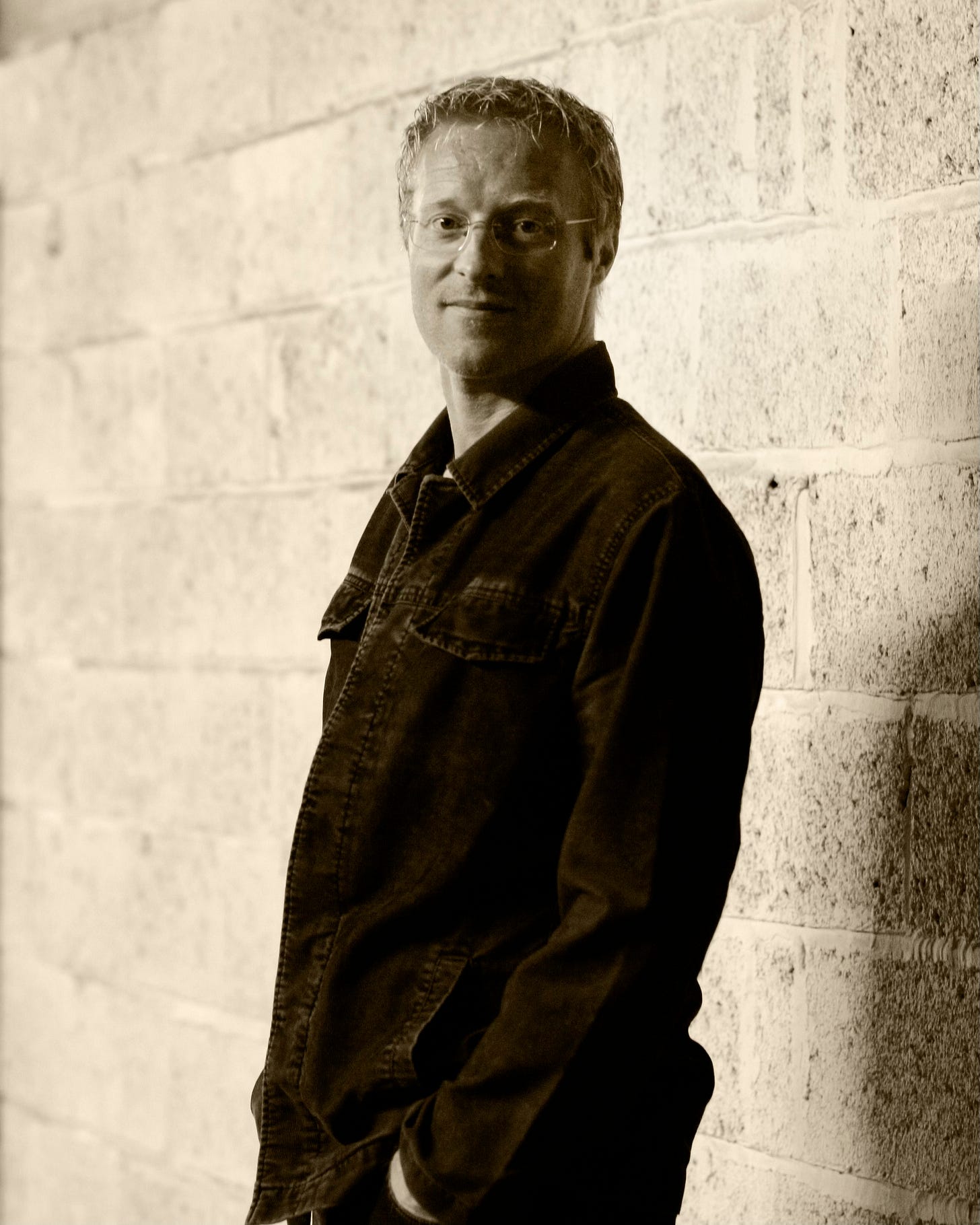How Biscuits Saved My Career
"I thought to myself, don’t people learn better when they’re having fun?" Crime writer Chris Simms on being a Consultant Fellow

As a Consultant Fellow for the Royal Literary Fund (RLF), crime writer Chris Simms regularly delivers workshops to staff, academics and students at university institutions across the UK. He talks us through his journey from thriller writer to workshop leader.
You can find out more about our Consultant Fellows here.
Can I get one thing straight before we go any further? I’m not a ‘proper’ academic. I don’t have a PhD. After graduating from university, I went off round the world backpacking. As for what I studied – let’s just say it’s the sort of degree likely to raise the eyebrows of a Daily Telegraph reader. So, when I was asked by the RLF to join the Consultant Fellow programme, a shadow like Nosferatu’s loomed large in my mind: imposter syndrome.
Me, facilitating workshops for PhD students, postgraduates and university staff keen to improve their academic writing? Who was I to teach such things? But here I am, a few years later, doing exactly that.
“A tangled sentence is a tangled sentence, regardless of what it’s describing.” Chris Simms
The training programme to become an RLF Fellow took place over several months. It was intensive and involved both written work and hands-on activities. During the final session, we had to lead the rest of the group as we presented a live teaching exercise. I chose forming an argument. The way I did this was to divide the room into two teams – I got one arguing for custard creams as the best biscuit option, and the other for hobnobs.
My lasting memory of that afternoon was of a room full of highly regarded poets, playwrights and novelists earnestly debating whether the detachable nature of a custard cream made it superior to the dependable dunkability of a hobnob. And I thought to myself, don’t people learn better when they’re having fun?
Before my first thriller was published, I worked as a copywriter in the advertising industry. It’s a profession that drills into you the importance of writing clearly and concisely. No one reads ads because they want to: a hint of waffle and they’ll turn the page.
Because of that know-how, the first workshop I led at universities – and it’s one I still run today – was for support staff, not academics and professors. It’s called Write With Impact! and it focuses on things like the subject lines of emails, opening hooks, and calls to action.
I now deliver several university workshops, and the thread that runs through all of them is how to make your writing resonate with the reader, whoever that might be. This is central to the world of advertising, and it’s something good writers do instinctively. After all, if your writing pushes the reader away – if the way you articulate your points makes your meaning hard to fathom – all your ideas will go to waste.
“‘The cat sat on the mat’ is not a story. ‘The cat sat on the dog's mat’ is.” John le Carré
All my workshops dwell on this to some extent, but especially the ones where I focus on grant funding because funding is essential for academic research, and if an academic is able to create a compelling narrative about their research, it can help potential funders engage.
To do this, I use narrative film-making techniques to help researchers focus in on the story at the heart of their work. If you’ve been neck-deep in intense research activity for months, if not years, then this can be difficult. I particularly like the approach developed by Randy Olson in his book, Houston, We Have a Narrative: Why Science Needs Story.
Rather than hitting your reader with a mass of factual statements that have no obvious thread (the all-too-common ‘And, And, And’ trap), you create a compelling structure by instead using ‘And, But, and Therefore’ – also known as the ABT technique.
Here’s the technique applied to a well-known film:
There is a girl and she lives on a farm.
But a violent tornado whisks her to a strange land.
Therefore, she must find a way to get home.
Too easy? How about this:
There is an idyllic coastal resort and it’s really popular with holidaymakers.
But a giant shark is eating swimmers.
Therefore, someone with a big boat needs to go out and save the day.
What you’ll notice is the complete absence of unnecessary detail: no mention of Dorothy, Kansas, wicked witches, yellow brick roads, emerald cities and ruby-coloured slippers. Or a shark-hunter called Quint.
In workshops, we play about with applying ABT to favourite films, books, TV shows or musicals. Once everyone is warmed up, we then adapt the approach to an academic context, usually each participant’s PhD.
The reason it works so well is because it sets up narrative flow. John le Carré nailed it when he said, “‘The cat sat on the mat’ is not a story. ‘The cat sat on the dog's mat’ is.”
One is just a statement, the other is the promise of change – which is the very essence of any story.
I also deliver one-on-one sessions to researchers in subjects across STEM (Science, Technology, Engineering and Maths) and Arts & Humanities disciplines. This flummoxes some people. How, they ask, can you give advice to someone studying astrophysics when you know absolutely nothing about it? But a tangled sentence is a tangled sentence, regardless of what it’s describing.
In other words, as an RLF Consultant Fellow, I’m not challenging claims or accuracy, but advising on coherence and clarity. It’s surprising how common so many issues in academic writing are: a lack of signposting or a glut of nominalisations, a foggy argument or a sprinkling of commas in the wrong places.
I think one reason these workshops are so effective is because, as Consultant Fellows, we’re external to the university which has booked us. This has two implications: first, we bring the insights and strategies of a professional writer alongside our experience in academic writing. Secondly, although our the workshops are offered by the university, they aren’t of the university. This means participants can enjoy a degree of freedom they might not feel if the event was being delivered by a senior member of the faculty.
As for me, I can say – hand on heart – there would be far less novel-writing without my work as a Consultant Fellow. Making a living as a writer isn’t easy. Very few are able to do it full time, which means we need to earn money elsewhere. The RLF has been that income source for me. Before becoming a Consultant Fellow I was part of the RLF’s Writing Fellow scheme and I have also worked with senior students as part of the Bridge, where Fellows provide workshops in schools and colleges. Without these sources of income, I would have gone back to being a freelancer in the advertising industry.
But being a Consultant Fellow is about more than just paying the bills. Spending time with other Consultant Fellows – we sometimes deliver workshops in pairs and often meet as a group – has exposed me to other writers and other forms of writing that I never knew existed.
I’ve been lucky enough to receive incredible training and now, if I choose to, I can put Fellowship of the Higher Education Academy (FHEA) after my name. And through meeting scores of PhD candidates, early-career researchers and full-time lecturers, I’ve learned about the infinitely fascinating topics which drive them. All I try to do is help those people describe their work in ways that engage, excite and enlighten the reader.
And the dusting of sugar which sits on top of all this? It’s made me a better writer, too.
After being selected by Waterstone’s as one of their ‘25 Authors For The Future’, Chris Simms has since been nominated several times for Crime Writers’ Association Daggers and the Theakston’s Crime Novel of the Year award. He continues to scribble away from a cosy hut in his garden, a scruffy little lurcher lying at his feet.





